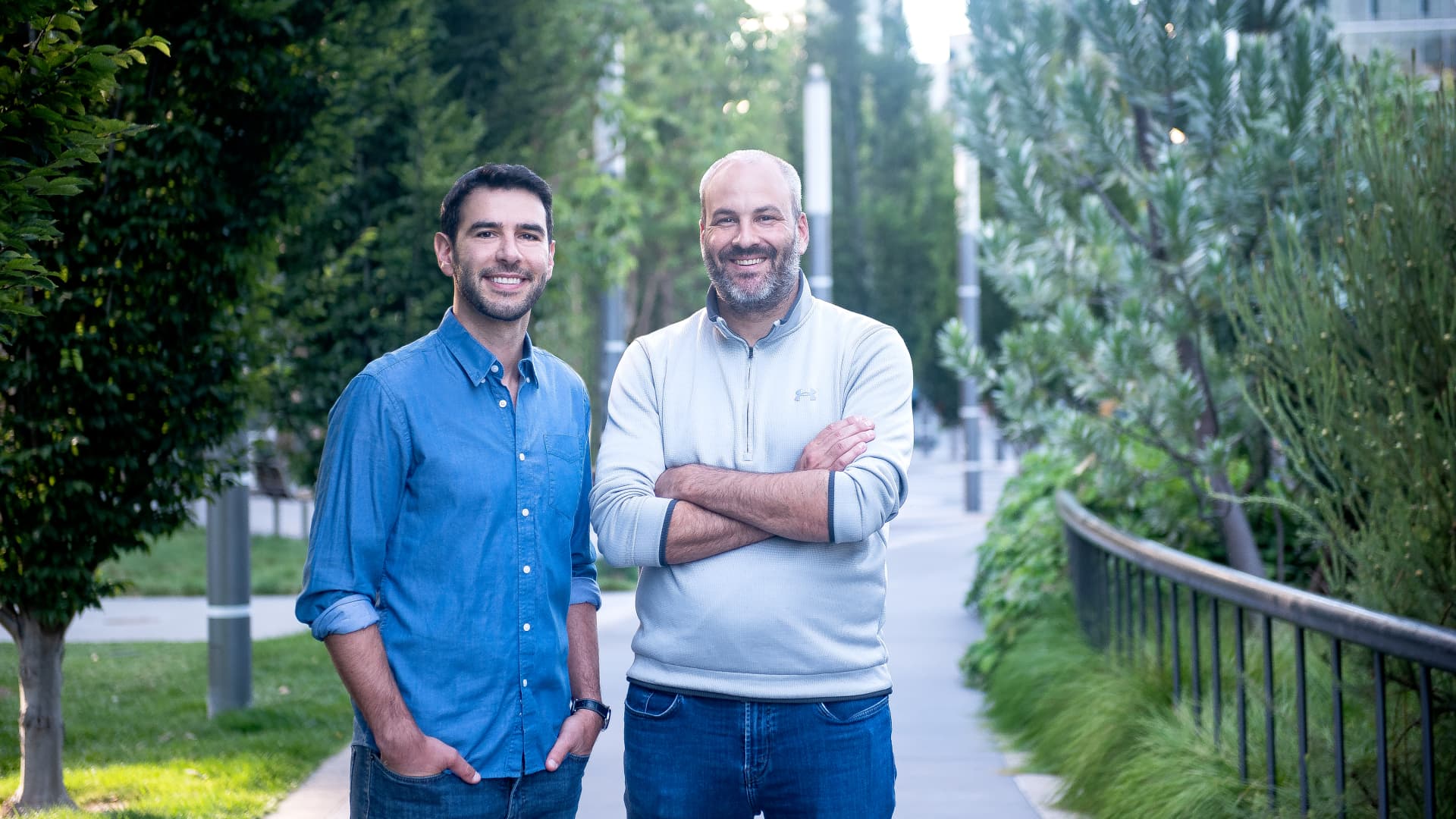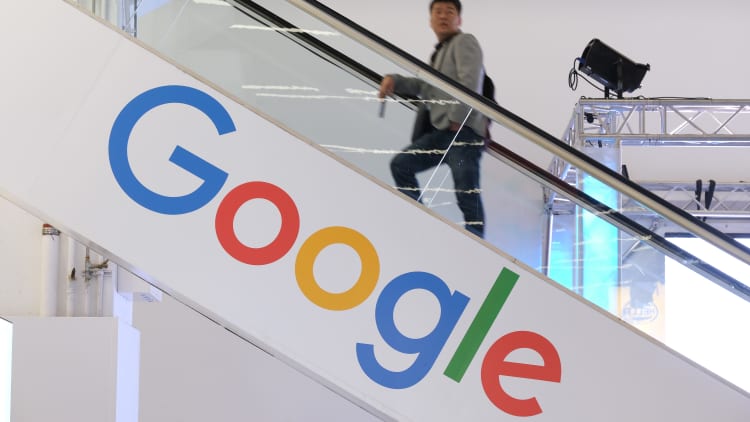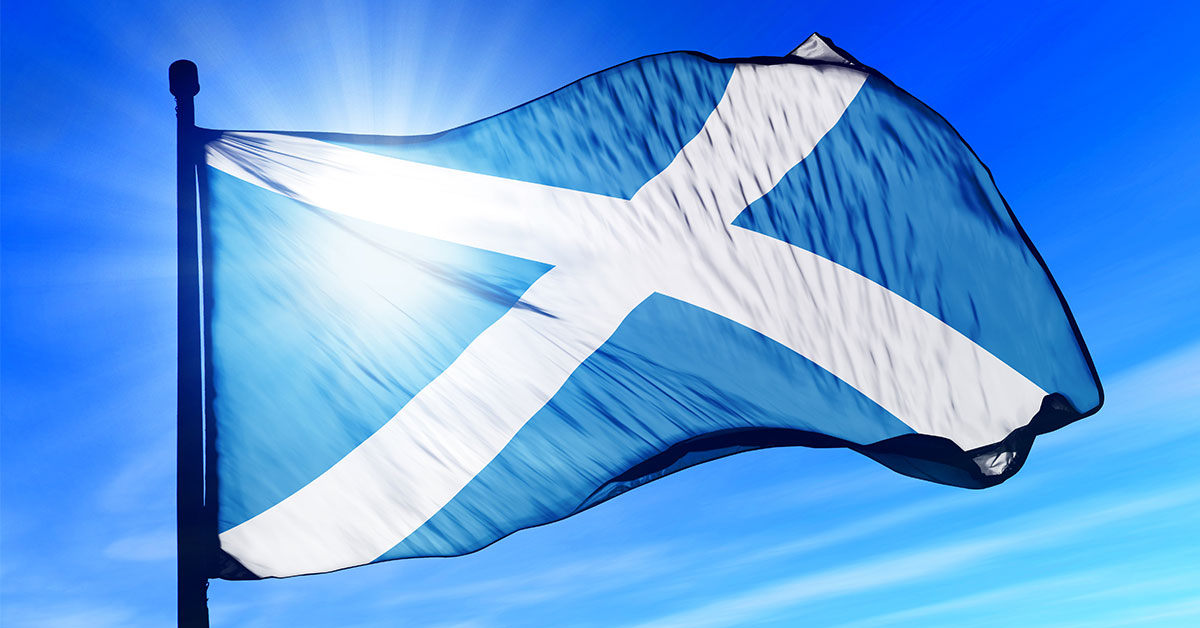Facebook and Bain have a new tool to help employees track their contributions to climate change
Climate Club aims to help employees figure out how to reduce their emissions associated with work, such as business travel and remote work.

Adam Braun and Philip Charm, co-founders of Climate Club
Photographer is Bonnie Rae Mills, photo courtesy Adam Braun
Adam Braun's first two entrepreneurial ventures had to do with education.
First, he launched Pencils of Promise in 2008, a nonprofit organization that has started more than 500 schools in Ghana, Guatemala, Laos and Nicaragua. In 2017, he launched the education startup MissionU, which WeWork acquired the following year.
Braun's next venture, Climate Club, is focused on helping large companies engage their employees in reaching their climate goals. The company, which is emerging from stealth on Wednesday, is opening with Facebook parent company Meta and management consulting company Bain among its first pilot customers.
Around a year ago, Braun and his college roommate at Brown, Philip Charm, got together with their 4-year-old children.
"As we were watching our young children play, and really just exploring the world around them, our conversation was drifting into what their future is going to look like, and the life that we want for them ahead," Braun told CNBC.
That conversation included realizing that by the time their children are as old as Braun and Charm are now, it would be just past 2050.
"Their futures will really be determined by the decisions we make starting now," he said. "That became this really profound call to action for us, as parents to young children, but also, I would say, as caring citizens, that we had to do something about this."
At the same time, Braun and Charm were watching large companies across the board make bold decarbonization commitments that employees were mostly ignoring or not involved with. Solving that disconnect is the task of Climate Club.
"The simplest distillation of it is that we embed sustainability into the employee experience. And we do so both with alignment towards net zero, as well as true business goals," Braun told CNBC.
As part of the company's launch, Climate Club is also announcing it has raised $6.5 million in seed funding led by XYZ Venture Capital and Vestigo Ventures.
"We believe that Climate Club will be one of the most important tools in the Chief Sustainability Officer's tech stack," Chauncey Hamilton, a partner at XYZ, told CNBC. "Corporations have set ambitious goals for hitting Net Zero and keep pushing the timeline up earlier and earlier to meet their goals with lots of companies targeting 2030 or sooner. With increased pressure and regulations ahead, we see it as imperative to create a culture of reducing carbon emissions throughout an enterprise."
Vestigo Ventures was interested in Climate Club to increase employee satisfaction, helping with recruiting and retention.
"The data is clear that employees want to be at companies that make the world better — and expect more from their employers," Mark Casady, the founder and general partner at Vestigo Ventures, told CNBC.
Indeed, almost seven in 10 workers care about a company's environmental track record when considering whether to take a job, according to a Gallup poll conducted in March of 2021. Twenty-four percent of survey respondents said a company's environmental track record is a major factor in their decision, and 45 percent said it would be a minor factor.
"Climate Club is hitting the market at exactly the right time to enable employers and employees to work together on these goals," Casady told CNBC. "Climate Club's combination of software and engagement initiatives solves the challenge of collecting accurate Scope 3 emissions data while enabling reduced costs, measurable carbon reduction, and new pathways to growth."
Addressing Scope 3 emissions
Climate Club aims to help employees learn what they can and should be doing within the company to reduce carbon emissions and then providing specific recommendations for how they can make changes.
The startup will provide each employee with data tracking their contributions to greenhouse gas emissions. Then, it will give each employee areas to improve, activities they ought to focus on and best practices to follow.
Climate Club focuses on all areas of emissions that employees can influence, but in practice that often turns out to be Scope 3 emissions — those are emissions that are generated throughout a company's value chain, rather than emitted directly (Scope 1) or through the purchase of electricity or other energy sources used to run the business (Scope 2).

Scope 3 emissions are hard to track — and also are often the largest category of emissions, according to the EPA. They include emissions that come from assets and activities that are not contained within the boundary of a company but that come from a company's value chain. That could include emissions associated with purchased goods and services, transportation of goods and services, business travel of employees, commuting of employees, the use of sold products, end-of-life treatments for sold products, and the list goes on.
For example, Climate Club will track emissions associated with things such as business travel, including air travel, ground transportation and hotels. It will help make recommendations for employees' commutes, and the amount of energy used in remote and hybrid work. It will also track emissions associated with purchased goods and services that employees use, including and starting with food that companies purchase for employees and the associated waste. And Climate Club is working on building solutions tailored for specific job categories, such as engineering, finance, procurement, marketing, human resources and event management.
Getting help wrangling scope 3 emissions is one reason Meta is hiring Climate Club.
"We are launching a pilot of the platform with employees," Melanie Roe, spokesperson for Meta, told CNBC. "Through our partnership with Climate Club, we will empower Meta employees to understand and participate in the work that needs to be done to reduce scope 3 emissions across our business."
So too for Bain, which is starting with a pilot in one key U.S. office and plans to add other locations in 2023.
"Bain & Company has long been a leader on sustainability issues, and we are committed to aggressive goals to reduce the impact we have on climate change. The only way we meet these goals is by engaging our teams at the front line, and by providing the tools they need to make good decisions in how they deliver exceptional results for our clients," Sam Israelit, the chief sustainability officer at Bain, told CNBC. Bain connected with Braun through the company's alumni network.
In addition to tracking employee-related emissions, Climate Club also collects and organizes ideas that employees have to drive sustainability within the company. That's already happening at Bain, Braun told CNBC.
"Great examples include reduced emissions travel and commute solutions, employee waste management (food waste & single use plastics), plant-forward meal stipends, work from home energy efficiency solutions, and more," Braun said.

 JaneWalter
JaneWalter 
































